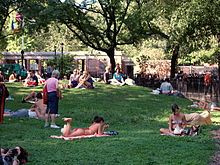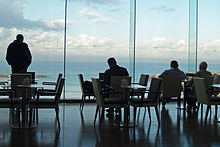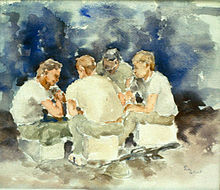
Leisure
Background to the schools Wikipedia
SOS Children produced this website for schools as well as this video website about Africa. Sponsoring children helps children in the developing world to learn too.
Leisure, or free time, is time spent away from business, work, and domestic chores. It also excludes time spent on necessary activities such as eating, sleeping and, where it is compulsory, education.
The distinction between leisure and unavoidable activities is not a rigidly defined one, e.g. people sometimes do work-oriented tasks for pleasure as well as for long-term utility. A distinction may also be drawn between free time and leisure. For example, Situationist International maintains that free time is illusory and rarely free; economic and social forces appropriate free time from the individual and sell it back to them as the commodity known as "leisure". Certainly most people's leisure activities are not a completely free choice, and may be constrained by social pressures, e.g. people may be coerced into spending time gardening by the need to keep up with the standard of neighbouring gardens.
Leisure studies is the academic discipline concerned with the study and analysis of leisure.
Cultural differences
Time available for leisure varies from one society to the next, although anthropologists have found that hunter-gatherers tend to have significantly more leisure time than people in more complex societies. As a result, band societies such as the Shoshone of the Great Basin came across as extraordinarily lazy to European colonialists.
Workaholics are those who work compulsively at the expense of other activities. They prefer to work rather than spend time socializing and engaging in other leisure activities.
Gender gap
Men generally have more leisure time than women. In Europe and the United States, adult men usually have between one and nine hours more leisure time than women do each week.
Adolescents
Free time has potential for youth development, which is influenced by parental attitudes of interest and control, mediated by adolescent motivational style.



